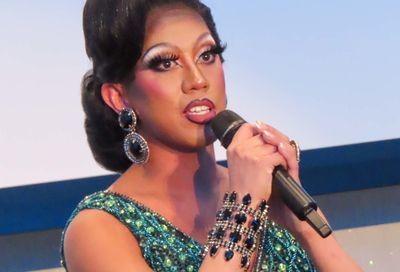Matchmaking
You Should Meet My Son is rife with clichés, most of which are pretty funny – because they're true
According to Glamour magazine, a man is gay if he doesn’t like sports, has a subscription to Men’s Fitness, and his shower curtain is covered with pictures of Michelangelo’s David. At least that’s the magazine quiz that Mae (Joanne McGee) uses to figure out that her attractive, single, 30-year-old son is looking for Mr. – not Ms. – Right.

You Should Meet My Son
This is just one example of the stereotyping and humor that fills the comedy You Should Meet My Son from first-time feature film director Keith Hartman. The project is rife with clichés, most of which are pretty funny – because they’re true.
In order to enjoy Hartman’s film, you have to be willing to accept certain premises: that a mother (even a Southern one) doesn’t realize that her son’s ”roommate” of five years who joins them at all family gatherings is actually his lover. That the son’s stoic silence on the subject of relationships persists through weekly dinner parties featuring different potential female dates. And that this same mother can turn on a dime as soon as she learns of his actual orientation. If you can make it past these plot points, you’re headed for a good time.
One of the more unique aspects of Hartman’s film, which he also wrote, is that it’s a gay film that’s not actually about the gay man. Mae and her spinster sister, Rose (Carol Goans), are the central characters, and they dive headfirst into the gay scene to find a suitable husband for Mae’s son, Brian (Stewart Carrico). The film’s humor is derived from two women being exposed to gay stereotypes of all shapes and sizes. The two glimpse into the great gay way as they discover the Internet for the first time (really?) and websites like Manhunt.
There are a couple moments that make You Should Meet My Son more than just a mindless comedy. Mae goes through the usual litany of self-blame when she realizes that Brian is gay: I took him to the Nutcracker, I let him watch The Wizard of Oz and all those Madonna videos, etc. Again, nothing new, but a funny delivery nonetheless. After the two women visit a conversion center in the hopes of finding Brian a ”cure,” they come to a place of acceptance with lightning speed. While their process is understandably expedited for plot purposes, the actual moment between the sisters is genuinely touching. And it helps create a foundation for the farce to follow.
Hartman struggles to sustain the plot throughout the entire film. Just as Mae and Rose’s foray into the bar scene starts to wear thin, the story takes a turn for the really bizarre, and Hartman pushes the patience of even the most forgiving audience. In a scene stolen straight from Auntie Mame, the film rides right off the rails into the sunset.


 AND ONE HALF
AND ONE HALFStarring
Joanne McGee,
Stewart Carrico
RA Xtra
Friday, March 11
7 and 9:15 p.m.
DCJCC
1529 16th St. NW
$12
reelaffirmations.org
Fortunately, the cast is wonderfully lovable, providing a constant level of accessibility until the end. McGee gives a charming performance as the doting mother. While the character’s transformation might leave some room for doubting, McGee sells the woman’s love for her son completely. There’s real chemistry between her and Goans, and they create a pair of meddling mother hens whom you’d love to have in your life, but maybe not your family.
Carrico actually has a tough role to play. Since Brian is a secondary character in the film, he’s supposed to be a babe and a catch, but his actions make him a little unlikable. Carrico relies on good looks and a few soulful moments to redeem the character. It’s just enough to warrant a pass.
In addition to Mame’s story being a source of inspiration, there are definite tinges of To Wong Foo, Sordid Lives, Big Eden and many other iconic gay films. While not living up to the original material, it does allow Hartman to introduce a varied cast of characters for some background flair, including drag queens, leather boys and a queer-youth support group. The film gets a little preachy at the end, but there’s nothing like a naked painting of George W. Bush to break the tension.
Like the perils of dating, not everyone is going to fall in love with You Should Meet My Son, but it certainly won’t be the worst night of your life. And you’ll still feel good about it in the morning.
Support Metro Weekly’s Journalism
These are challenging times for news organizations. And yet it’s crucial we stay active and provide vital resources and information to both our local readers and the world. So won’t you please take a moment and consider supporting Metro Weekly with a membership? For as little as $5 a month, you can help ensure Metro Weekly magazine and MetroWeekly.com remain free, viable resources as we provide the best, most diverse, culturally-resonant LGBTQ coverage in both the D.C. region and around the world. Memberships come with exclusive perks and discounts, your own personal digital delivery of each week’s magazine (and an archive), access to our Member's Lounge when it launches this fall, and exclusive members-only items like Metro Weekly Membership Mugs and Tote Bags! Check out all our membership levels here and please join us today!





















